#18 Brumaire
Explore tagged Tumblr posts
Text
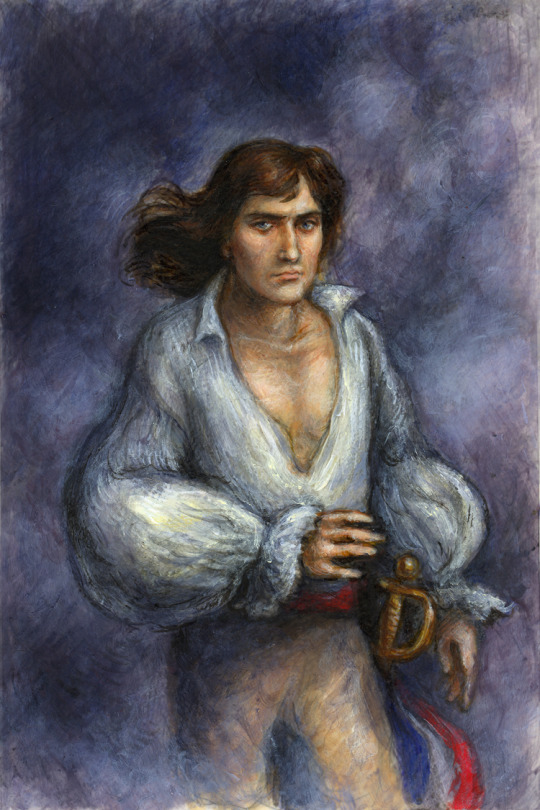
Happy coup of 18 Brumaire everyone (the 9-10th November)! I did this painting in 2022 for a pin-up French Republican style calendar put together by @xiranjayzhao, a project which I believe is on hiatus at the moment. But here's sexy young Napoleon emerging through the Brumaire mists, ready to mess you up.
#illustration#art#napoleon bonaparte#napoleon#french revolution#brumaire#brumaire coup#painting#1790s#18 brumaire
51 notes
·
View notes
Text
So Roustam wasn’t told about the 18 Brumaire thing ahead of time. He was told that Napoleon and Duroc “went on a walk” in Paris and then randomly both got murdered 😭😭 Apparently Josephine even pretended(?) to pass out on the sofa. So Roustam gets told this and he starts sobbing and everyone else was really upset because they all thought Napoleon and Duroc were dead. Then later he sees Napoleon randomly show up on a horse and he’s still alive. So everyone who had been crying then starts celebrating like hooray you’re not dead… lmaooo
#this is from Roustam’s memoir btw#I’m crying 😂#i kind of love Josephine very dramatically pulling off this whole scheme#Roustam Raza#Roustam#napoleon#napoleon bonaparte#Josephine#Duroc#napoleonic era#napoleonic#first french empire#french empire#napoleonic shenanigans#history#18th brumaire#18 brumaire#Brumaire
53 notes
·
View notes
Text




Details from La journée de 18 Brumaire an VIII by Jean Duplessis Bertaux. There are two scenes, worth looking at (links below). This printer lived through l'ancien régime, the Directoire, Consulate, Empire and Restoration. He has a series about the Revolution. Just go to commons.wikimedia.org and search for his name.
wikimedia 1
wikimedia 2
31 notes
·
View notes
Text
2 june 1793 and 18 brumaire double standarts
Good evening, everyone. This is a very short post to explain what could be seen as an inconsistency on the part of someone who advocates against double standards. And it might be regarding two events, for which you can blame me (namely the events of 18 Brumaire and the day of June 2, 1793).
I really like Momoro and Hanriot. As you may have seen, I confess to hating Bonaparte. I condemned what he did during his coup d'état against the Directory by bringing in the military and expelling the Directory's deputies (more precisely, Murat and Leclerc did this if I'm not mistaken), and the outlawing was nonetheless justified. What he did with his colleagues Sieyès and Ducos is called high treason (and he expelled all the deputies, not just half, all of them). In my eyes, what he did cannot even be justified, as he did it for power (I know the Directory was a mess, but even if by some miracle it had performed well, Napoleon would have always been ready to commit a flagrant violation of all republics). He did it to seize power in the most unlawful manner possible with extremely dubious accomplices (to put it mildly). That's how I see Bonaparte: endless thirst for power .
In comparison, Momoro, Hanriot, and Chaumette are much more honest and act really for save the revolution ( even if there are in the hebertist Hebert that I dislike and I think I don't need to explain why) . When they acted against the Girondins by brandishing cannons against the Convention, we need to consider the context. The Girondins poorly managed the situation and endangered the revolution by proposing a war project that Hébertists like Chaumette fought against with all their might. The arrest of Hébert and Isnard's speech ignited the powder keg, not to mention the internal and external situation, while the Girondins were primarily voting for the Committee of Twelve and attempting to arrest Marat. In my opinion, if this had continued, the revolution could have ended much sooner (it sounds like Girondin bashing, but in reality, they were much more complex and not as incompetent – see the post about "In Defense of Manon Roland" here). When Isnard threatened Paris with destruction and, by extension, the sans-culottes for the umpteenth time (which surprises me because Isnard wasn't that radical since he opposed Marat's arrest, I wonder why he gave such a speech), the sans-culottes acted by demanding the arrest of the Girondins and only them. They didn't ask for the Plain to be expelled, and the Montagnards supported them. When they re-invaded the Convention, it was to demand measures that proved beneficial, such as the formation of the revolutionary army and the maximum. When Momoro wanted to attempt another insurrection, we also need to consider the context of life in Paris, which was hard. Hanriot and Chaumette were against it probably out of pragmatism because they knew that the Convention could not do anything more with the current situation and perhaps that the law of Ventose was sufficient for the moment as a guarantee (even if unfortunately this law was not applied) of the "good faith" of the Convention. Which shows that they will only intervene when they deem it necessary ( I don't deny mistakes by Hebertist by the way here one of my post https://www.tumblr.com/nesiacha/744960791081631744/the-difference-in-treatment-between-the-indulgents?source=share).
Additionally, Chaumette was elected by the Commune, yes, elected and not appointed, unlike Bonaparte. Hanriot resigned after June 11 and was re-elected by universal suffrage and would have accepted defeat if he had lost.
Some say that Hanriot, during Thermidor, like some of his colleagues who were outlawed (the Robespierre brothers, Saint-Just, Le Bas, Couthon), had a certain legalistic aspect and more scruples than Bonaparte, even though their situations were harder and less justified. It's important to note that Momoro, Chaumette, and Hanriot did not use these insurrections to seize power; that was not the goal. I saw in their insurrections more the act of forcing the Convention's hand in a situation where France was in turmoil, to take the necessary measures. On the other hand, no matter how competent the Directory might have been (in any case, it really wasn't), in my opinion, Bonaparte (and others like him) would always have waited for the opportunity to seize power with the help of an unelected armed force and take power exclusively for himself. The mindset of these Hébertists when they invaded the Convention and their goals were clearly not the same as Bonaparte's, and that's why I criticize Bonaparte more (see much more severely). But it's ironic that in many films, Hanriot and his troops are portrayed as drunkards, and that day is seen as one of the darkest for the Republic (I still put my hands on my face for the horrible demonization of Hanriot in Heffron's film) while in the 2002 film "Napoleon," for example, the coup d'état is seen as something very good.
P.S.: In any case, let's acknowledge that the Sans-Culottes still committed a very serious violation of the law by forcing the arrest of elected deputies, even if it was them or the sans-culottes in a certain way. But if they had been outlawed, no matter my great affection for them, I recognize it would have been legal for them to be executed (that Bonaparte was a bigger "bastard" does not absolve them). Even if the Convention was always ambiguous about the right of insurrection... It doesn't really help.
But don't forget this is just my interpretation . So don't hesitate to contradict me :)
#frev#french revolution#hanriot#momoro#chaumette#napoleon#18 brumaire#directory#directoire#robespierre#saint just#couthon#le bas
3 notes
·
View notes
Text
“Let the dead bury their dead, for thus only can it discover its own true meaning.”
— Karl Marx, The Eighteenth Brumaire of Louis Bonaparte
#Karl Marx#The Eighteenth Brumaire of Louis Bonaparte#Louis Bonaparte#Brumaire#18 brumaire#18th brumaire#18th brumaire of Louis Bonaparte#Marx#quotes#German literature#literature#1800s
1 note
·
View note
Text
The worst thing about mental health issues is that you have like no idea what's going on, on any level
Phisically, if something hurts where the heart is, it's the heart avenging all those chips.
If you have a tummy ache there are like 3 options: appendix being an attention whore; kidneys hating me and my way of life and wishing death upon me; same, but for liver.
But tonight I am sad (TM). Why? Is it touch starvation or recent lack of meaningful sociolisation or general loneliness because I'm uniquely fucked up in a way incomprehensible even to me, let alone another?
Or is it lack of goal in life combined with time to think it over, or is it lack of any more or less productive activity, including that which I planned for the holidays?
Or is it the extra fucked up sleep schedule, or being in the same house with the family, or is it the fuck all sunlight I get, or some sort of addiction I don't even know exists has already destroyed my brain, maybe that addiction is chocolate, maybe it's linguistic YT Shorts, or is it depression or a combination of any of those things with ADHD and/or autism, which I may or may not have, and which or may not in some capacity be the cause(s) of that crap?
Or did I just play one unbalanced tf2 match too many today?
Fuck if I know!
I'm not even gonna proof-read that post, any mistakes are there to convey my confusion and cast it upon ye as a 4-minute-long curse
#mental health#i hate it so much#whats going on#i dont fucking know#you understand or nah#i planned to read Marx these holidays#and I'm only like 1/4th of the way through 18 Brumaire#it's terrible
2 notes
·
View notes
Text
The French Revolution (1789-1799) was a period of major societal and political upheaval in France. It witnessed the collapse of the monarchy, the establishment of the First French Republic, and culminated in the rise of Napoleon Bonaparte and the start of the Napoleonic era. The French Revolution is considered one of the defining events of Western history.
The Revolution of 1789, as it is sometimes called to distinguish it from later French revolutions, originated from deep-rooted problems that the government of King Louis XVI of France (r. 1774-1792) proved incapable of fixing; such problems were primarily related to France's financial troubles as well as the systemic social inequality embedded within the Ancien Régime. The Estates-General of 1789, summoned to address these issues, resulted in the formation of a National Constituent Assembly, a body of elected representatives from the three societal orders who swore never to disband until they had written a new constitution. Over the next decade, the revolutionaries attempted to dismantle the oppressive old society and build a new one based on the principles of the Age of Enlightenment exemplified in the motto: "Liberté, égalité, fraternité."
Although initially successful in establishing a French Republic, the revolutionaries soon became embroiled in the French Revolutionary Wars (1792-1802) in which France fought against a coalition of major European powers. The Revolution quickly devolved into violent paranoia, and 20-40,000 people were killed in the Reign of Terror (1793-94), including many of the Revolution's former leaders. After the Terror, the Revolution stagnated until 1799, when Napoleon Bonaparte (1769-1821) took control of the government in the Coup of 18 Brumaire, ultimately transitioning the Republic into the First French Empire (1804-1814, 1815). Although the Revolution failed to prevent France from falling back into autocracy, it managed to succeed in other ways. It inspired numerous revolutions throughout the world and helped shape the modern concepts of nation-states, Western democracies, and human rights.
#studyblr#history#military history#warfare#politics#french politics#french revolution#estates general of 1789#french revolutionary wars#reign of terror#coup of 18 brumaire#france#first french republic#first french empire#napoleon bonaparte#louis xvi
0 notes
Text
Why does Marius get so angry at this pun joke that he spams Les Amis with a thirty page essay on Napoleon?
“[Courfeyrac said] ‘that number 18 is strange and strikes me. It is Bonaparte’s fatal number. Place Louis in front and Brumaire behind, you have the whole destiny of the man, with this significant peculiarity, that the end treads close on the heels of the commencement.”
Enjolras, who had remained mute up to that point, broke the silence and addressed this remark to Combeferre:—
“You mean to say, the crime and the expiation.”
This word crime overpassed the measure of what Marius, who was already greatly agitated by the abrupt evocation of Waterloo, could accept.
When Courfeyrac is talking about the way 18 is always associated with Napoleon’s life, he is referring to the Coup of 18 Brumaire (when Napoleon first seized power) and the restoration of Louis the 18th/XVIII. This pun happens in the context a conversation where Bossuet discussed the date of the battle of Waterloo, on the 18th of June.
Enjolras refers to the coup of 18 Brumaire as a “crime,” which enrages Marius, because he’s implying Napoleon’s entire reign as emperor is a crime.
55 notes
·
View notes
Text

mmm.. I'd wish to see the list of the seduced by Alexander))
Napoleon From 18 Brumaire to Tilsit, Georges Lefebvre

https://linktr.ee/maypiion
83 notes
·
View notes
Text
Napoleon visits Bessières' castle (1810)
Elie Baudus in the first volume of his "Études sur Napoléon" has a description of Napoleon, after he had divorced Josephine, visiting Bessières' home. That's interesting insofar as Elie argues that Bessières' close friendship with the Beauharnais family had before gotten him in trouble with his master:
For a long time Napoleon had been haunted by the distressing thought that he would leave no direct heir to succeed him in this colossal empire, the creation of his genius. The empress's age meant that it was no longer conceivable that she would bear him children, so ideas of divorce had been on his mind since 1807. Some rumours about this project were spread during the trip he made to Italy shortly after returning from Tilsitt.
This journey to Italy happened not quite that shortly after Tilsit, actually, but only in late 1807 (November/December). At the same time as the preparations for the coup in Spain, by the way.
Marshal Bessières, who would always accompany him on such occasions, had been left in Paris to await the return of the guard, to lead it when it made its triumphal entry, to receive the celebrations that the capital intended to offer to these elite legions, and to preside over those that the guard was to give. The Marshal was very attached to the Beauharnais family. General Bonaparte, doing justice to Bessières' perfect manners and the noble qualities that distinguished him, had given him as a mentor to Eugène during the Egyptian campaign. After 18 Brumaire, this young man, in his capacity as colonel of the Guides, who had become the chasseurs à cheval of the consuls' guard, again found himself under the command of Bessières. The Marshal therefore learned with chagrin of the rumours that were spreading. Having acquired the certainty that the police were not uninvolved, he committed the noble imprudence of listening only to his initial impulse, went straight to Fouché, and confronted him with a very heated argument on the subject. His intimate conviction was, first of all, that the divorce would be an impolitic act; after that, he believed that the Emperor's attachment to Josephine was such that no consideration could decide him to pronounce it, and that consequently this prince had nothing to do with these manoeuvres.
When Napoleon returned, the Marshal was quickly proven wrong; the Emperor welcomed him coldly and immediately removed him from court by sending him to take up a command in Spain. The almost constant disfavour with which he was treated for several years proved to him that if Fouché had taken it upon himself to spread such rumours, at least he had not been disagreed with. Marshal Bessières was in South Beveland when the dissolution of Josephine's marriage to the Emperor was announced. On arriving in Paris in January 1810, he hastened to Malmaison to court the repudiated empress, and continued to be a regular visitor. Far from resenting him, the emperor seemed, on the contrary, to return some of the favour he had once shown him; he even chose this moment to spend two days at the Château de Grignon, owned by the marshal.
We have only had this one opportunity to see the emperor in his private life; we are going to recount how these two days passed. The character he displayed during these two days is quite unusual; besides, isn't everything of interest in the life of such a man?
Napoleon arrived at Grignon in the morning; his entourage was numerous; the King of Bavaria accompanied him, as well as the Queens of Naples and Holland and the Grand Duchess of Baden; then came the Prince de Neufchâtel, Grand Marshal Duroc, Marshals Moncey and Davoust, General Lauriston, Prince and Princess Aldobrandini Borghese, an equerry, a chamberlain, some officers of the hunt, the Duchesses of Bassano and Cassano, Madame de Broc and Mademoiselle de Mackau. When he got out of the carriage he went hunting; the park was very large and contained a lot of game; there was even a very fine pheasantry.
The emperor killed a large number of pheasants and partridges, but missed almost as many. Every time he fired his rifle, a hunting officer, standing next to him, whether the game fell or not, would still say "Broken wing, dangling thigh". Napoleon, who had misfired several times in succession, became impatient with this eternal refrain, and said at the last mention of a broken wing: "Well, go and fetch it". This order would have been difficult to carry out, because the bird was flying away. The clumsy courtier complied willingly and replied: "That's right, Sire, I was mistaken". After hunting for a few hours, the emperor retired to the appartment that had been prepared for him, and did not reappear until a few moments before dinner.
We do not know what whim had passed through the imperial mind, but Napoleon was already at table when he realised that he had forgotten to invite to dinner with him la Maréchale Duchesse d'Istrie, who had the honour of receiving him at her home, and, far from compensating her later for this singular distraction, he showed himself to be in a detestable mood towards her. Wanting to play the little game known as "le furet du bois joli", a piece of ribbon was needed; this was requested from Madame la Maréchale, who unfortunately did not have one in her possession; she enquired of all the other ladies to obtain it: Princess Aldobrandini was the only one who could provide her with this service. All these enquiries had taken a long time; so the emperor said to the maréchale, who presented it to him: "Since the time you have kept me waiting, you should have cut up all your dresses." - "Sire," replied this excellent woman, "if I had done so, it still would not have given you a single piece of ribbon." - We have never been able to find out the reasons for this rude behaviour on his part towards a woman of admirable and well-deserved reputation, who, sharing the Marshal's noble feelings, had not waited for his return to Paris before going to bring consolation to the august banished woman of Malmaison.
In the evening, the Marshal presented his aides-de-camp to the Emperor, who said to him on seeing the youngest: "Isn't it that little chap, Bessières, who, on the road to Wels, came to give me an inaccurate report about the direction you had made the cavalry take?" Despite the Marshal's protests, assuring him that the officer he was referring to was not at Grignon, he persisted for a long time in blaming this young man for the unfortunate blunder which was so close to his heart. In any case, he was only mistaken about the face of the culprit, for the fact was correct.
Afterwards there was dancing; everyone took part, whether they liked it or not, in this kind of entertainment, even the King of Bavaria, to whom the emperor said rather brusquely: "King of Bavaria, dance". And this monarch, then aged fifty-five, with a roundness that must have made this exercise very painful for him, hastened to take a dancer and place himself at one of the quadrilles. However, Napoleon had no grudge to satisfy against this sovereign at the time, so it did not occur to him to imitate our good Henry IV, who quickly made the king of the League, the Duke of Mayenne, walk through his park of Monceaux in revenge for the embarrassments the latter had caused him. But that was how Napoleon treated his vassal kings. No one, moreover, escaped his singular fantasies in this regard; the hero of Auerstædt and Ekmülh, whose appearance and manners were not particularly suited to this kind of pleasure, was also obliged to take part.
Though Davout apparently loved to waltz. It may just have been the wrong dance for him.
Not even the old duchess of Cassano, lady-in-waiting to the queen of Naples, who vainly objected to the dancer Napoleon sent her that she had given up dancing thirty years ago; she had to appear in a quadrille: the emperor wanted it that way. The public was not misled when it was said that the tune of Monaco was the one he preferred to any other, for it was repeated every time the emperor danced. The evening ended with the figure known as le grand-père.
Apparently Napoleon spent a good night because his attitude seems to have changed completely the next morning:
The day passed in much the same way as the day before, with the difference that Napoleon was constantly friendly to everyone and surprisingly cheerful for a man whose mind was always occupied with serious matters. The next day, at eight o'clock in the morning (it was winter at the time), it was unexpectedly announced that the emperor was leaving for Rambouillet; all the ladies who were travelling were obliged to throw themselves into the carriage, having barely had time to put on a dress. This sudden awakening, this lack of toiletries, did them no favours; there were only a few among them whose beauty, already tired by too many vigils, nevertheless triumphed over this harsh ordeal; we will mention the Queen of Naples, Madame de Broc and Princess Aldobrandini.
36 notes
·
View notes
Note
why does enjolras not like napoleon? didn't he improve life for the average frenchman
You're asking two different, though related, questions here.
The question of whether Napoleon improved life for the average French man (or the average French person , which, given how badly his Code affected women's civil rights, is a different question) is very debatable. Improved by what measure? How much of whatever improvements were all his doing vs using institutions already in place? How much is that balanced out by the problems he caused with his wartime imperialism? etc etc etc. You could build a whole academic career around this question, I'm not joking about it being debatable. It is as such something I have Opinions about but not something I can give you a Quick Answer for!
Why Enjolras and the other Amis dislike Napoleon is a lot more direct: he overthrew the First Republic in The Coup of 18 Brumaire, in a move that eventually let him make himself Emperor. They're small-r republicans. They want a republic. They're all ultimately going to die because they want a republic that bad and he sunk the only one their country had ever had.
They undoubtedly have a lot of other political issues with him and the Empire (the reinstatement of slavery in French colonies,for instance) but that's the starting base for their dislike: France had a republic and Napoleon overthrew it to (ultimately) make an Empire with himself as unremovable Emperor. They're not gonna be fans.
#people can fight over Napoleon and his career forever#and doubtless will#but if you're gonna do it on this post please be civil and kind XD
78 notes
·
View notes
Text

The Coup d'État of 18-19 Brumaire - General Bonaparte in the Conseil des Cinq-Cents (Council of Five Hundred) at Saint-Cloud, 10th November 1799
by François Bouchot
#napoléon bonaparte#napoleon bonaparte#coup d'etat#art#france#françois bouchot#history#europe#european#saint cloud#château#paris#french#napoleonic#napoléon#napoleon#bonaparte#versailles#château de versailles#palace of versailles
125 notes
·
View notes
Text
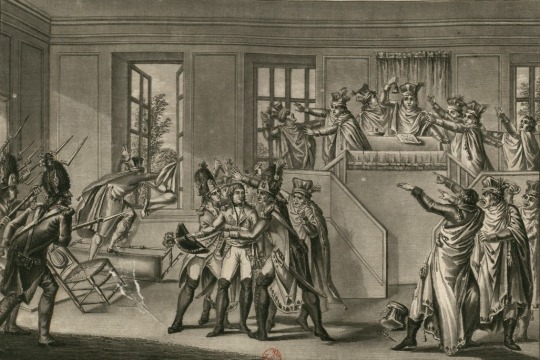
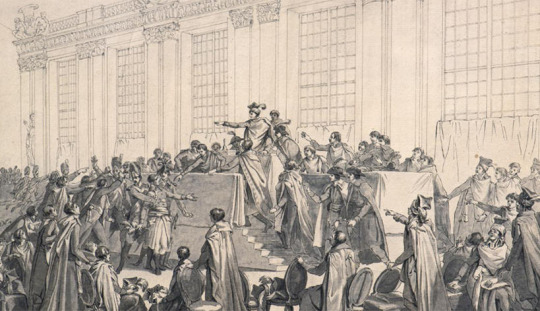
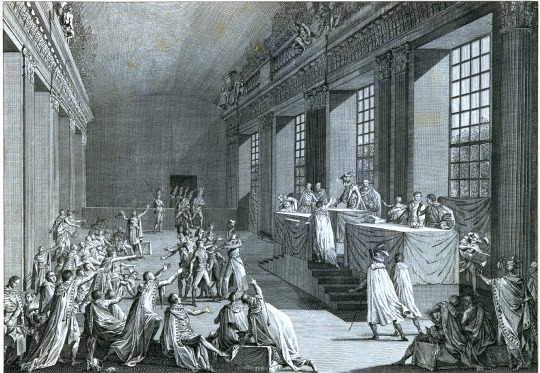
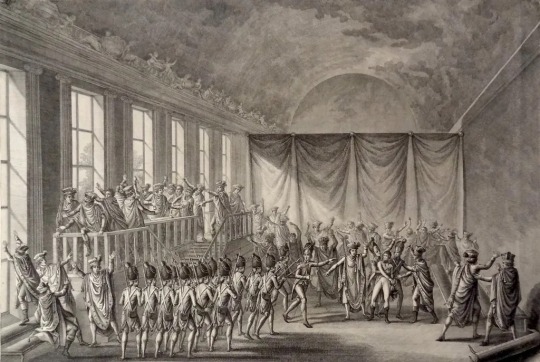
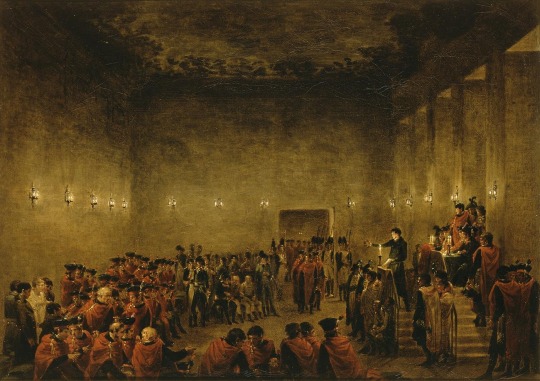
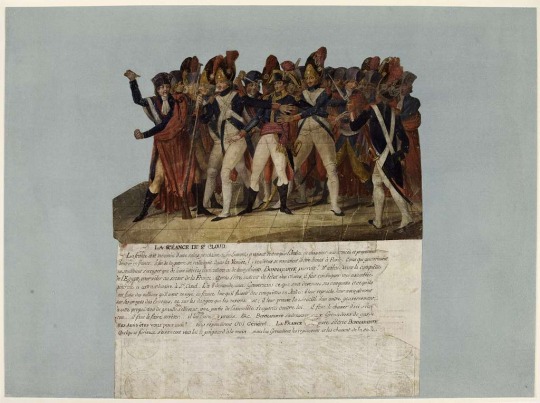
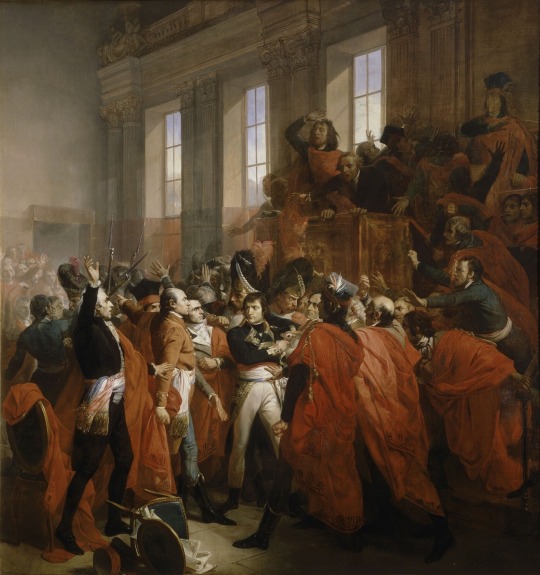

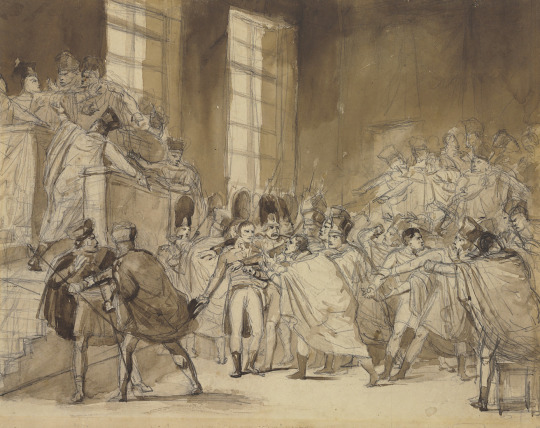
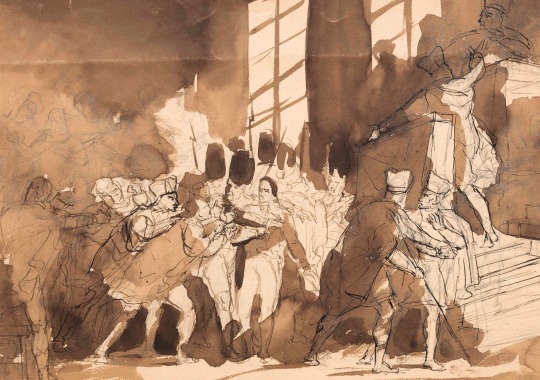
Scenes from 18-19 Brumaire
Jean-Baptiste Morret, Séance du Conseil des Cinq-Cents tenue a St Cloud le 19 brumaire an huit, 1799
C. Chardon (imprimeur), Isidore Stanislas Helman, Journée de Saint-Cloud, le 18 brumaire an 8, 9 Novembre 1799, Musée de la Révolution française
Coup d'État du 18 Brumaire dans l'Orangerie de Saint-Cloud, Domaine national de Saint-Cloud
Gravé par Le Beau d’après Naudet, Coup d'État du 18 Brumaire an VIII
Jacques Sablet, Le Dix-Neuf Brumaire
Jean Baptiste Lesueur, Coup d'Etat des 18-19 brumaire an VIII : Bonaparte menacé par les députés du Conseil des Cinq-Cents, Saint Cloud, le 10 novembre 1799
François Bouchot, Orangerie du parc de Saint-Cloud — Coup d'État des 18-19 brumaire an VIII — Le général Bonaparte au Conseil des Cinq-Cents, à Saint Cloud. 10 novembre 1799
Giacomo Aliprandi, Francisco Vieira ‘Portuense’, Napoleon entering council chamber at St. Cloud, protected by guards with fixed bayonets against daggers of council members
Alexandre-Évariste Fragonard (1780-1850), The Coup of XVIII Brumaire: Bonaparte before the Council of Five Hundred
François Bouchot, Coup d’Etat du XVIII Brumaire : le général Bonaparte au conseil des Cinq-Cents à Saint-Cloud pencil, pen and brown ink and brown wash on paper (A study for the painting at the National Museum of Versailles)
#Brumaire#Napoleon#napoleonic era#napoleonic#napoleon bonaparte#18 Brumaire#18th brumaire#eighteen brumaire#eighteenth brumaire#France#history#french history#first french empire#french empire#1799#1700s#18-19 brumaire#art#painting#drawing#french revolution#illustration#Art history#sketch
62 notes
·
View notes
Photo
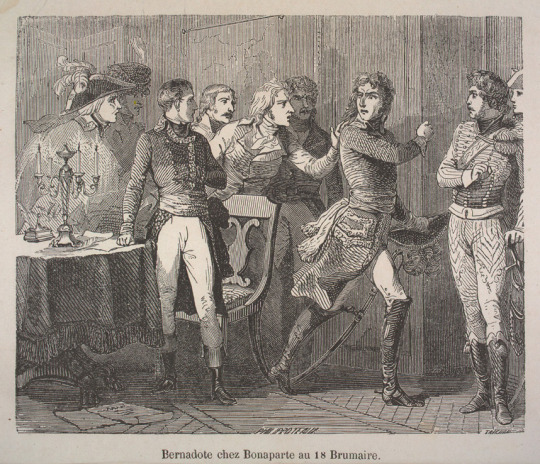
Bernadote chez Bonaparte au 18 Brumaire
wikimedia commons
8 notes
·
View notes
Photo
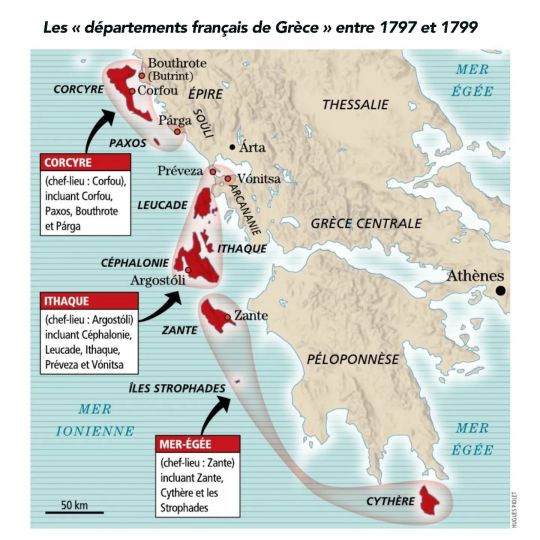
The Ionian Islands or “French departments of Greece” between June 1797 and March 1799
Revue « Historia » n°925, janvier 2024
by cartesdhistoire
By the Treaty of Campoformio (October 17, 1797), France acquired the formerly Venetian islands of the Lonian Sea, strategic bases which will help France to participate in the sharing, which is believed to be imminent, of the spoils of the Ottoman Empire: north to south, Corfu, Paxos, Lefkada, Ithaca, Kefalonia, Zante, plus Cythera to the south of the Peloponnese, and the numerous islets that separate them. Added to this are the Venetian establishments on the coast of Epirus: Párga, Arta, Préveza and Bouthrote.
It was Bonaparte himself who, by a letter to the Directory of 25 Brumaire Year VI (November 15, 1797), provided for the organization of these new French departments of Greece, three in number: Corcyra (with the capital of city of Corfu), Ithaca (with Argostóli as its capital) and Aegean Sea (with Zante, its capital, Cythera – the medieval Cerigo – and the quasi-desert archipelago of Strophades).
The French established a foothold in Kefalonia on June 28 and in Corfu on the 29th. The jurist Pierre–Jacques Bonhomme de Comeyras was responsible for administering the three departments from Corfu, as commissioner of the Directory. Provisional municipalities, with local notables known to be Francophiles, were set up as well as a departmental direction called the “Central”, not to mention, in parallel, a military administration, trying above all to control the French troops so that they did not does not behave like an army of occupation.
But, as part of the War of the Second Coalition, an offensive by the Russian fleet, acting on behalf of the Ottomans, took place from October 12, 1798 (battle of Nicopolis and capture of Préveza). Then followed, in order, the captures of Cythera, Zante, Ithaca, Kefalonia and Lefkada until November 27. Besieged Corfu resisted from November 18, 1798 to March 3, 1799.
In March 1800, the archipelago became the Republic of the Seven Islands, under the nominal authority of the Porte but under that, in reality, of Russian forces.
55 notes
·
View notes
Text
at this point i really hate napoleon more than words can say… im going to keep listening to the podcast because it’s good but at this point it’s been a million episodes since he’s done anything smart, he totally fumbled his way through the coup of 18 brumaire and he’s so smug still. (sobbing) i need to go back in time and stab him, please help me
#the campaign in egypt was a disaster… the coup he almost messed up entirely…. should have died back in italy!#i also read about how he cut ties with his brother lucien. for the stupidest reasons#truly a mad king with evil advisor moment. idiot!!
28 notes
·
View notes